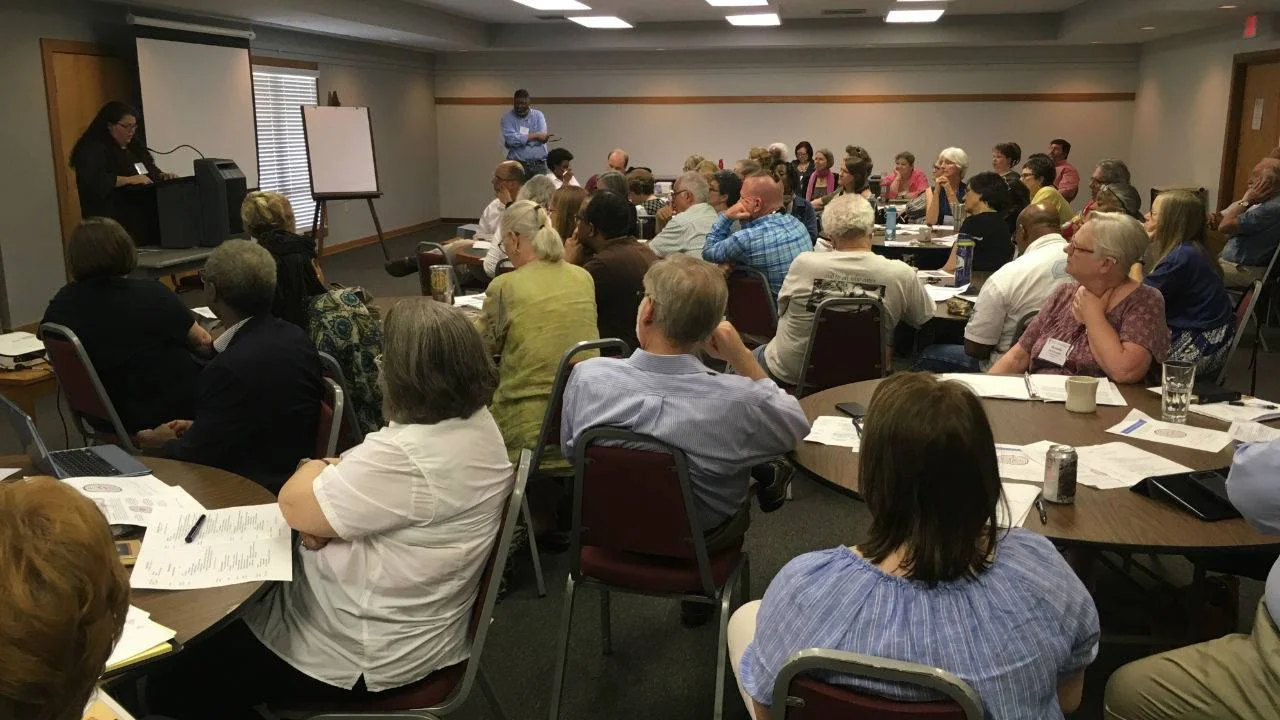Episcopalians Meet to Discuss Healing the Racial Divide
More than 100 Episcopalians from across Mississippi are in Canton, to talk about racial reconciliation.
More than 100 Episcopalians from across Mississippi are in Canton, to talk about racial reconciliation. One of the guest speakers is Katrina Browne from Pennsylvania. She produced a documentary about her ancestors in Rhode Island, after discovering they were the largest slave trading family in U.S. history. Browne says she and members of family retraced the Triangle Trade Slave Route from Rhode Island to Ghana to Cuba and it was life changing.
"The majority of us have changed our careers as a result and are champions for the idea of reckoning process in this dialogue, so we go to churches, and schools, and community groups and museums and present and help facilitate dialogue," said Browne.
Mississippi Bishop Brian Seage says the nation is facing growing challenges surrounding race. He points to comments made by actress Roseanne Barr comparing an Obama Administration official to an ape as an example.
"And for her to say such incredibly vile things that insult a person's humanity the way they did. I found it very shocking," said Seage.
Anita George, a retired educator spearheaded the event. She says they're committed to diving into the issue of race and being open about how they feel.
"We have to step outside of ourselves and look at ourselves. When we do that in community with other people we're more likely to accept where we are the good and the bad," said George.
Bishop Seage says it will take dialogue and building relationships to foster racial healing.
Becoming the Beloved Community
The Racial Reconciliation Task Force of the Episcopal Church in Mississippi is bringing in nationally recognized speakers and leaders for an overnight workshop at Gray Center on May 30 and 31, 2018.
The Racial Reconciliation Task Force of the Episcopal Church in Mississippi is bringing in nationally recognized speakers and leaders for an overnight workshop at Gray Center on May 30 and 31, 2018. For more information or to register go to www.dioms.org/digital_faith/events/3177891
Minister’s message is simple: Jesus
To hear Will Willimon tell it, he’s a Methodist preacher who likes to talk about Jesus.
“I think when it comes down to it, Jesus is the most interesting thing Christians have to say to the world and to themselves,” he said in a recent phone interview.
Willimon, who’s also a former bishop of the North Alabama United Methodist Conference, professor of the practice of Christian ministry at Duke University Divinity School, and the author of 70 books that have sold more than a million copies, will spend next weekend in Greenwood talking about his favorite subject.
Hosted by the Episcopal Church of the Nativity, he will give lectures on the night of March 3 and the morning of March 4 and a sermon at Nativity on March 5. The entire community is encouraged to attend, said Nativity Rector Rev. Peter Gray.
Willimon holds a Master of Divinity degree from Yale and a Doctorate in Sacred Theology from Emory, in addition to 13 honorary Doctor of Divinity degrees.
He said he has been blessed in his long career to “be a bishop for eight years in Alabama, a parish pastor for about 10 years and a professor and minister at a fine university for 20 years.
“I’ve had a variety of opportunities to see Jesus at work and to see people responding to him in a variety of ways,” he said.
At the heart of his teachings about preaching and about Jesus is Willimon’s strong belief in redemptive possibility. That, he said, is one of the blessings of being a Christian in Mississippi.
Willimon started out preaching in a small South Carolina town and has spent most of his life in the South, encouraging racial reconciliation as a Christian’s duty.
Most recently he published “Who Lynched Willie Earle: Confronting Racism Through Preaching,” a book rooted in his early life experience and his life teaching others how to preach about difficult issues.
The book begins with a historical narrative “that happened at the hands of people in my hometown,” Willimon said.
In Greenville, South Carolina, in 1947, a black man named Willie Earle was dragged out of a jail cell and brutally murdered in what’s generally considered the last public lynching in South Carolina.
“There was an internationally prominent trial where all 31 white lynchers were acquitted and Strom Thurmond bragged to the governor, ‘Hey, at least we had a trial,’” Willimon said.
Willimon said that though he grew up in the midst of it, he didn’t hear about Willie Earle until he was in college.
“Since then, I’ve had a kind of lifelong interest in it,” he said.
The part of the narrative that inspired him and others was a sermon by a young Methodist preacher who came to South Carolina shortly after the lynching.
“He stood up and preached and said, ‘Who killed Willie Earle? We all know the answer to that question; it was those men who lynched him,’” Willimon said.
“But that answer was too simple. He went on to say that ‘we’ killed Willie Earle with our segregation laws and economic injustices and our history of discrimination. It was an amazing act of courage, a response to a terrible tragedy of many dimensions.”
The book asks what it means to speak out about race through sermons, and it draws on sermons from some of Willimon’s students following the 2015 Emanuel African Methodist Episcopal Church shooting in Charleston.
“What I try to say is that America’s racism is an opportunity to proclaim the gospel, to say that the redemptive possibilities of God are just limitless,” he said.
Willimon says people would often question him in his attempts to renew and transform the church in Alabama.
“They’d say, ‘Bishop, do you think we can really change the course of history?’ And I’d say, ‘I really believe it is the nature of God to change people.’”
Willimon said preachers are accustomed to talking about things people often would rather they not bring up, and dealing with doubts is one of the great gifts of the ministry.
Recently engaged with students talking about the particular challenges of this time in America, Willimon said the conversation turned to “what a great time (it is) to talk and to see our national situation as a call to teaching and to reflection for sermons.
“It’s great to turn to Jesus for help just thinking this through,” he said. “The constructive approach is not to fret, to say, ‘I’m going to try to think like a Christian about this.’”
Contact Kathryn Eastburn at 581-7235 or keastburn@gwcommonwealth.com.
New Episcopal Bishop
Mississippi Episcopalians mark the start of a new era with the installation of their next Bishop. The Right Reverend Brian Seage begins his tenure as the 10th Bishop of the denomination.
It was a bittersweet weekend for Episcopalians, who gathered in Jackson for their annual meeting. Members honored retiring Bishop Duncan Gray, III and installed his successor, Bishop Brian Seage. Gray led the denomination for 15 years. He tackled the challenges of rebuilding six churches destroyed by Hurricane Katrina, prevented the diocese from splitting over the issue of same-sex marriage and promoted racial reconciliation. Through it all, it's the relationships Gray says he'll cherish.
"There are quite a few folks that I have met for the first time and those relationships are spread over 93 churches and half a dozen schools and all of that. I was in two or three churches or schools every week." Said Gray.
Bishop Seage said his goals are to listen to the vision of the members, strengthen smaller churches and support youth programs.
"I'm really here in large part because a youth director years ago took a great interest in making sure that a program existed in the church that I grew up in. I really look forward to working with others to strengthen youth ministry and to make sure that we present Christ in young peoples' lives." Said Seage.
A native of Thousand Oaks, California, Seage has served in Mississippi since 1998.


